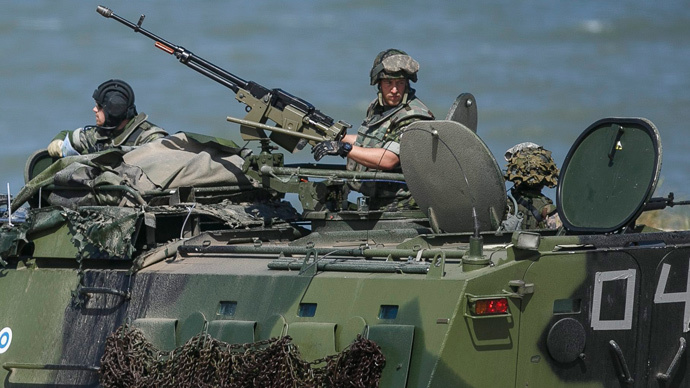‘US bipartisan war party expanding to Russia's border’

NATO policy makers are seeking to expand the alliance to Russia’s border, but an accident during war games might lead to a shooting war, James Carden, executive editor for the American Committee for East-West Accord, told RT’s In the Now.
RT:After President Putin announced Russia's strategic forces will get over 40 new intercontinental ballistic missiles in 2015, NATO warned Russia is playing with fire. Is it really that hard to see that NATO is on Russia's border and not the other way round?
James Carden: It seems that it is very difficult for some people to understand. In this country and particularly in the administration we are seeing a war party form, it’s bipartisan in nature and it seeks to obviously expand NATO to Russia’s border and to incorporate many of the republics of the former Soviet Union. And the fact that Russia is reacting to this plan seems to have taken many of them by surprise.
READ MORE: Moscow will respond to NATO approaching Russian borders ‘accordingly’ – Putin
RT:Reports say British RAF planes have been scrambled three times in the last 24 hours to intercept Russian jets flying close to NATO military exercises in the Baltic. How far can the rhetoric go?
JC: Unfortunately, this could be just the beginning. We’ve seen since the beginning of the Ukraine crisis NATO has increased its air patrols in and around Russian air space, we’ve seen the Russians respond in kind. What I would hope would dawn upon a lot of these policy makers is that something terrible; it could happen by accident. If something happens involving these flights or with some of the US trainers that are in Ukraine now, we could be well on our way unfortunately to a shooting war in Europe. That’s something we really ought to be thinking about and that ought to inform our policy response to the Ukraine crisis in particular.
RT:What can Russia do to convince NATO that expansion is not the way to cooperation or to cooling down some of this rhetoric?
JC: I think a focus on effects on the ground is the place to begin. Right now we have an unfolding humanitarian catastrophe in the Donbass, where over 6,000 people have lost their lives and over a million displaced. The blame for that in this country falls squarely upon the shoulders of Mr. Putin. I saw something kind of extraordinary yesterday on Capitol Hill. Samantha Power [US Ambassador to the UN] was testifying there and she was asked, “How many of the separatists and their families are among these 6,000 people who have been killed?” She said that she didn’t know. And the point of the question was how many of these victims have been killed by the force coming out of Kiev, and she claimed ignorance of it. So we need to get straight what’s going on in the Donbass in order to have an informed policy response.
READ MORE: Russia has no plans for new arms race – Putin’s aide
RT:How much does media coverage play in the heated rhetoric between the US and Russia?
JC: That’s an interesting question. In the US, we hear a lot about Russian propaganda, particularly with regard to RT and Sputnik, the internet news organization sponsored by the Russian government. So news that comes out of Russia that explains Russia’s point of view is 'propaganda,' but the incessant coverage coming out of the Washington Post and the New York Times, among others, that continues to religiously hew to the neoconservative line is not propaganda at all. It plays an enormous role, particularly within the Beltway.
RT:If the US understands Russia's reaction to encroachment and Kerry’s statements prove that why not try a different policy?
JC: That’s a good question. Why not? Because the current policy hasn’t worked. I think to Mr. Kerry’s credit he did try to begin to institute a thaw in this new Cold War when he travelled to Sochi with President Putin and Foreign Minister Lavrov in May. That was a very good sign, but it was very telling that between his meeting in Sochi and the G7 that the people who are for a very hard-line response to the Ukraine crisis responded and they basically denounced and undercut Kerry’s move towards a détente.
The statements, views and opinions expressed in this column are solely those of the author and do not necessarily represent those of RT.
The statements, views and opinions expressed in this column are solely those of the author and do not necessarily represent those of RT.












